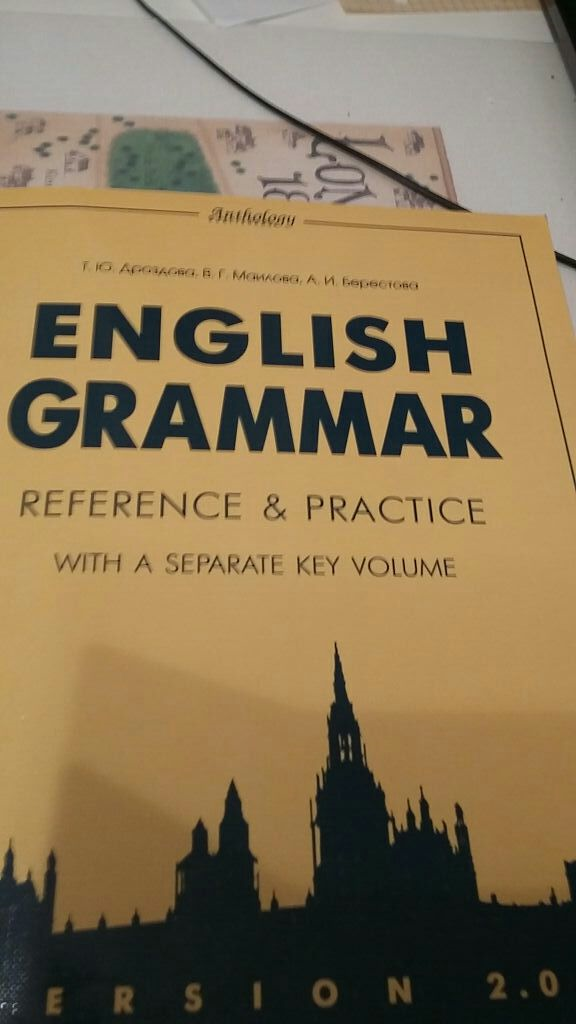“With a separate key volume” sounds really suspicious. Was it written by natives speakers?
Kristen Bellдобавила заметку 6 years ago

как вам этот учебник?
Обсуждение (30)
See the authors at the top. It's obvious
The first edition was in 1933 (!)
I tried to read the names at the top, but they’re too blurry in the picture.
Yikes, I shudder to think what they’re teaching.
I think double initials are pretty uncommon in both UK and USA, but this is possibly visible not as well on a phone as on a big screen.
Wow.. almost as old as a dinosaur ... Is this a collectors' item now? :)
Так что есть смысл покупать, она очень дорогая
?
Забудьте об этом учебнике, как о страшном сне, и НИКОГДА не покупайте учебников, написанных не носителями языка.
they’re too blurry in the picture
Г. Ю. Дроздова, В. Г. Майлова и А. И. Берестова
Если его переиздали в 2006, значит, учебник ценный. Проверенный, так сказать, временем! 🧐 26 ф. с. — это недорого. Берите! 😀
Есть и 2017. И всего 400 руб -
Налетай...
А если в соавторстве с носителями - тоже не покупать?
тоже не покупать?
Нет! Для учебы есть ЛингвоЛайв. 😋
А если в соавторстве с носителями - тоже не покупать?
Alex, а зачем нужно это соавторство, когда есть прекрасные учебники от уважаемых ведущих изданий: Oxford, Cambridge, Longman etc.
Хорошо, тогда подскажите 2-3 подобных учебника
Olga, this is probably where all the Russians got the dreaded “go in for sports”!
All the Russians got the dreaded “go in for sports” from
de slovar by Apresyan who had probably taken it from
Merriam-Webster's Advanced Learner's:
go in for (something) : to like or be interested in (something)
She doesn't go in for sports.
Igor, we know it exists, but was probably last used by Shakespeare when he took up tennis))) However, Olga and I get a chuckle from the fact that any time any mention of liking sports (or a sport) appears on LingvoLive, some Russian hotdog proffers the this dreaded expression and then defends it to the death.
For the majority of people it is very hard to learn even the basics of some foreign language. They never went abroad or met a foreigner. However, we want them to forget their school lessons of English... and start learning the modern language? I suppose we must reteach people only in the situation when they try to speak and are not totally understood.
If someone would use obsolete / not recommended words (e.g. ) “conspiratory, conspirative, conspirational, conspiracious, conspiratious” instead of “conspiratorial”, or if I would write “in stead of” instead of “instead of”... would I be misunderstood? 😏
You would not be misunderstood, but you would then fall into one of two groups: (1) someone who doesn’t care how they sound as long as they get the message across; or (2) someone who is eager to learn how to express themself correctly and idiomatically in a modern world language. I personally would like to think that most people would fall into group 2 since nobody wants to sound idiotic on purpose. But then it’s one thing to innocently parrot what you’ve learned in an outdated text and then accept the correction and learn something, and it’s another thing to argue that you’re right and continue to use “go in for sports” because you learned it in an ancient text and goddammit you’re gonna fucking use it! 😜 Because if it’s good enough for Г. Ю. Дроздова, it’s good enough for me! 🤨
Lucky I am! I can get into both of the groups. That's because I go in for languages. 😝
Вот мой любимый язык:
Вам пгивет от хозяев сайта: 😀 (см. Русско-английский словарь. (Американский вариант)) Бьюсь об заклад, что они поправлять не будут!
Yikes, that sounds like Russian with a French accent.
That's a Jew speaking Russian with a Jewish accent in its Odessa* version.
* Odessa — родина Одиссея (Ulysses). 😋
Обратите внимание, например, на последние слова: «Я имею выйти» = букв. I have to go out. Полное совпадение с английским. Так иногда говорят в западных регионах Белоруссии и Украины.
Ага! Как интересно)))